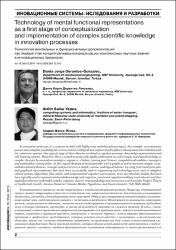Please use this identifier to cite or link to this item:
https://hdl.handle.net/20.500.11779/1294| Title: | Technology of Mental Functional Representations as a First Stage of Conceptualization and Implementation of Complex Scientific Knowledge in Innovation Processes | Authors: | Dorantes-Gonzalez, Dante Jorge Balsa-Yepes, Aldrin |
Keywords: | Functional Model Mental Model Multidisciplinary Mental Representation Cross-disciplinary |
Publisher: | Transfer-Innovations | Source: | Dorantes-Gonzalez, D.J., Balsa-Yepes, A., Technology of mental functional representations as a first stage of conceptualization and implementation of complex scientific knowledge in innovation processes, Innovations, 12(254), 2019, 2-9. | Abstract: | In innovation processes, it is common to deal with highly cross-multidisciplinary topics. For example, an innovation process may integrate psychological, neuroscientific, biological and engineering disciplines, among many others dealing with bio-cybernetic systems. One specific type of those theories is related to cognitive processes, knowledge representation, and self-learning systems. Therefore, there is a need to easily and rapidly understand, as well as apply and share knowledge of complex theories by innovation managers, engineers, scholars, training practitioners, computational modelers, managers, and stakeholders, among others. In this regard, the present article provides with a graphical tool to represent complex cross- multidisciplinary theories, concepts and processes in a simple, concise, and logical manner, by using functional principles and graphical representations that have been successfully used in engineering and technology areas such as adaptive control systems, algorithmic flow charts, and computational cognitive neuroscience. Once described the models that have been typically used to represent and model knowledge and cognition, functional cognitive modeling is introduced, and then applied to represent and model complex cognitive theories from psychology and neuroscience such as Jean Piaget’s Theory of Intellectual Growth, Antonio Damasio’s Somatic Marker Hypothesis, and Dante Dorantes’ Soft Skills Model. | URI: | https://hdl.handle.net/20.500.11779/1294 |
| Appears in Collections: | Makine Mühendisliği Bölümü Koleksiyonu |
Files in This Item:
| File | Description | Size | Format | |
|---|---|---|---|---|
| 2019.12 Technology of mental functional representations as a first stage of conceptualization and implementation of complex scientific knowledge in innovation processes. Innovations 12(54), 2019.pdf | Yayıncı Sürümü - Makale | 689.3 kB | Adobe PDF |  View/Open |
CORE Recommender
Page view(s)
56
checked on Jan 13, 2025
Download(s)
4
checked on Jan 13, 2025
Google ScholarTM
Check
Altmetric
This item is licensed under a Creative Commons License
